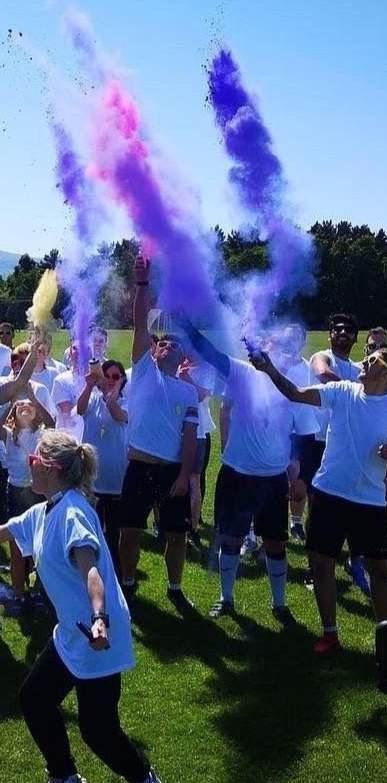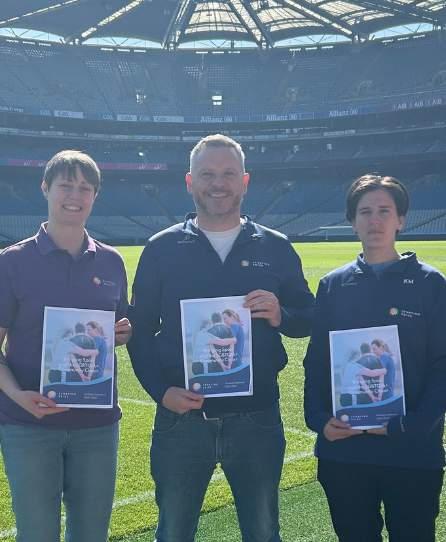
3 minute read
MARTIN M
from GNI ISSUE 68
by GNI MAG
Leading The Charge
In recent years, Ireland has seen significant progress in LGBTQIA+ rights, notably with the historic 2015 Marriage Equality referendum. Yet, for many Transgender people, the journey toward full inclusion, recognition, and safety continues and seems to be heading the wrong direction on an international level. Across Ireland, a range of organisations — from grassroots initiatives to national networks — are working tirelessly to defend and uplift Tran’s rights. Among the most notable are Sporting Pride, the Transgender Equality Network Ireland (TENI), Mermaids NI, The Trans Resource Centre, alongside a number of local and emerging groups.
Advertisement
TENI is perhaps the most prominent national body specifically dedicated to Trans rights in Ireland. Founded in 2006, TENI’s mission is to “advance the rights and equality of Trans people and their families.” The organisation has been instrumental in shaping key pieces of legislation, such as the 2015 Gender Recognition Act, which allowed Transgender people to self-declare their gender legally for the first time.
Beyond lobbying for legal reforms, TENI provides vital education and training services, supports healthcare access improvements for the Trans community, and hosts events that foster community resilience. Programs like Trans Education and Advocacy and peer support meetings have been critical in building a stronger, more visible Trans community across the island.
helping dismantle the barriers that keep many Trans individuals from fully participating in sports, a crucial sphere for both physical and mental wellbeing. On July 5th they will be hosting Ulster’s 3rd LGBTQIA+ Sports Day at Mary Peters Track in collaboration with Belfast City Council.
Mermaids Northern Ireland is a newer network that has begun to emerge in support of Trans and genderdiverse youth. Inspired by the broader Mermaids movement in the UK, this group focuses on providing peer support for young Trans people and their families in Ireland.
Please
Sporting Pride focuses on inclusion through a very different but equally vital avenue — sports. As an organisation working to promote LGBTQIA+ participation in sport, Sporting Pride recognises the unique challenges Tran’s athletes’ face, from discriminatory policies to hostile environments. Although not exclusively Trans-focused, the organisation places strong emphasis on ensuring that Trans and non-binary athletes are welcomed in sports settings at every level, from grassroots to elite competition. Several of the committee are Trans and non-binary and their accomplishments include setting up the first GAA team in the world to have a Non Binary Chairperson, the first basketball team in Ireland to have a Transgender President and opening many doors for the Transgender community in sports.
By collaborating with sporting bodies, running educational workshops, and advocating for inclusive policies, Sporting Pride is programming. In a landscape often dominated by general LGBTQIA+ organisations, a specifically Trans-led space is not only necessary but revolutionary.
Trans youth face disproportionately high rates of mental health challenges, bullying, and family rejection. Groups like Mermaids NI offer safe spaces, mentoring, and community connection, ensuring young Trans people do not feel isolated or abandoned.
The Trans Resource Centre aims to be a central hub of support, information, and community empowerment for Trans individuals across Belfast. It hopes to offer a variety of resources from crisis support referral contacts to educational workshop contacts and public outreach.

While these bodies are critical, local and grassroots groups also play a major role. Groups like Gender Jam (focused on Northern Ireland), LINC (supporting lesbian and bisexual women but also increasingly inclusive of Trans women), and smaller informal collectives in Cork, Galway, and Limerick are essential. These groups often provide peer support meetings, workshops, advocacy campaigns, and social events that affirm Trans identities at a community level.

Educational initiatives such as Belong To Youth Services — though not exclusively Transfocused — offer critical resources for Trans young people navigating school systems, which remain uneven in their approach to LGBTQIA+ inclusion.
Moreover, professional alliances like the Irish Council for Civil Liberties (ICCL) and Amnesty International Ireland have also incorporated Trans rights into their broader human rights frameworks, advocating at government level for anti-discrimination protections and better healthcare access.
Despite the passionate work of these organisations, significant challenges remain. Trans healthcare in Ireland is still fraught with long waiting lists, gatekeeping practices, and geographic disparities. Public debates around sports participation, gender recognition for non-binary people, and hate speech laws continue to polarise public opinion. Often these anti-Trans practices seem routed in sexism as we hear more and more horror stories of medical professionals ignoring the concerns of female patients.
Moreover, Trans people — especially Trans women of colour, migrants, and disabled Trans people — often remain marginalised within both wider society and even within the LGBTQIA+ community itself. Organisations like TENI, Sporting Pride, and others are increasingly aware of these intersectional issues and are working to create more inclusive and equitable frameworks. This work is growing at a fast pace because the organisations are collaborating more and sharing best practices.
As Ireland continues to grapple with its social attitudes toward gender and identity, the work of these organisations is more critical than ever. They not only defend the legal rights of Trans people but also nurture spaces where Trans individuals can live fully, authentically, and safely.
In a world where backlash against LGBTQIA+ progress is growing louder in some corners, Ireland’s Trans rights organisations offer a model of resilience, solidarity, and hope.
By Martin Murray










